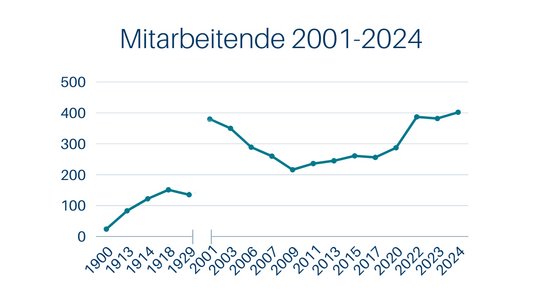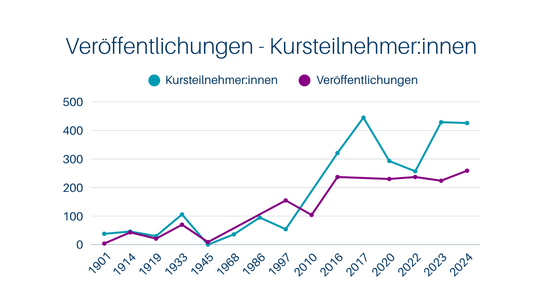BNITM in numbers
The library of the Bernhard Nocht Institute for Tropical Medicine (BNITM) has an extensive archive of historical documents and records, with additional sources held by the Hamburg State Archives. Nevertheless, it is sometimes difficult to obtain comparable figures on employees, research groups, publications and course participants: over 125 years of eventful history, data has been collected with varying degrees of consistency and not always in a uniform manner. In the annual reports from 1900 to 1949, for example, some parameters are not recorded consistently. In the annual reports available from 1947 onwards, there are no separate figures at all in the first few years, only continuous text. We have tried to take this into account in our graphics and still convey an approximate idea of how the institute has grown and, at times, shrunk over the decades.

Number of employees
Reliable personnel figures are difficult to determine. It is known that the ‘Institute for Maritime and Tropical Diseases’ started on 1 October 1900 with 24 employees. However, it was not until 1914 that personnel numbers were systematically recorded for several years. From 1926 onwards, the data becomes inaccurate, possibly because the records have been lost. There are no figures at all for the period from 1930 to 2000.
Research, healing, teaching
In its early years, the institute was housed in the old seamen's hospital at the Landungsbrücken. In keeping with its working motto, it combined research with patient care and teaching from the very beginning: the first four scientific publications appeared in 1901, and by the following year there were already 14. By the First World War, the number had levelled off at just under 50. Today, it is around 250 per year.
Shortly after the institute was founded, the department for ‘seafarers with internal illnesses’ at the Old General Hospital St. Georg was closed and a clinical department was set up in the Seamen's Hospital instead. In 1914, it moved into the Fritz Schumacher building. Since 2006, patients have been treated at the University Medical Centre Hamburg-Eppendorf.
In 1901, the first advanced training course for ship's doctors and colonial doctors took place, with practical exercises on detecting malaria and other pathogens and lectures on ship hygiene and quarantine. In 1908, the first three-month advanced medical course was held, an event in which thousands of doctors have been trained to this day. The course was rarely cancelled: only during the world wars and the coronavirus pandemic.

In its early decades, the institute's work focuses primarily on maintaining the health of colonial troops, ship crews and its own population. Today, the BNITM is primarily concerned with the health of people in countries affected by poverty-related and tropical diseases, travel and migration medicine, global health and pandemic preparedness.







